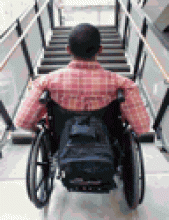When I was in my first year of medical school, one of my relatives approached me with a health problem. In this I know I'm not alone; every medical student has been in a similar position, and it continues after graduation. In my case it was my sister who sought my advice, and I learned from the episode to never give casual medical advice, no matter how harmless it seems.

Figure. Photo by: Fred Sebastian
My sister came to me with a concern about her son. She told me that he went to bed with terrible headaches, headaches so severe he couldn't get to sleep unless his mother was nearby. He would also complain of headaches at other times, like when he was being disciplined or during meals. She told me that she had been to her pediatrician several times, but that each time she was just given reassurance, that the pediatrician didn't think tests were necessary. She asked me a simple question: Do you think anything is going on?
I then did what to me now is unthinkable: I urged her to return to her pediatrician and insist on a CT scan. I said I do think something is going on.
What on earth was I thinking of? I had just finished studying anatomy and metabolism, there were five more units that year to go, I had never touched a kid in a professional manner, I had no pediatric training or even inclination. Even so, I felt qualified to interfere. I probably amplified my sister's anxiety by a factor of ten, and I potentially compromised the future care that my nephew would receive. My sister would always have a voice in her head telling her something was probably the matter with her child, and that voice would be mine.
Looking back, I recognize that my nephew was just acting out. The pediatrician's advice was wise, and mine foolish, perhaps reprehensible. Later I heard from my sister that she pushed the doctor to order a CT scan and the report came back normal. When she gave me the news, she actually thanked me for my advice. I don't think she knew what I had put her and her son through.
I simply don't do it anymore. I don't offer advice to friends or family — for the reason that, based on the evidence, I am spectacularly bad at it. I feel that if I were to say anything that would contradict what they would hear from their treating physician, then that dissonance would taint any future care they might receive. Well, that's not what my nephew/ brother/son, a doctor, said, they might think.
Sometimes my gentle refusal becomes a firm refusal. Some people want an explanation for their symptoms, they feel I'm qualified to give it, and they don't understand when I say no. So they ask again, or they rephrase. To them I say no again and in a different way. I am always careful to advise them to speak to their own physician about such matters.
I know that people make their decisions based on a variety of influences and I don't mean to overstate my own importance. I know that a few casual words would, in most cases, not harm anyone. But primum non nocere is our code and without a physical exam, without follow up, without the necessary objectivity, a lot of harm could potentially be done. I could inflict a diagnosis or a prognosis on an acquaintance or a loved one at a party or picnic, oblivious of the consequences and context, and setting up their own physician in the process.
I save my doctoring for the office.
— Dr. Ursus








